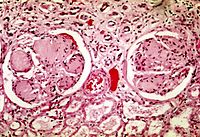
Photo from wikipedia
PurposeTo study oxidative stress status of early type 2 diabetic nephropathy (DN) patients with subclinical hypothyroidism (SCH) and to assess effect of l-thyroxine therapy on the oxidative stress in these… Click to show full abstract
PurposeTo study oxidative stress status of early type 2 diabetic nephropathy (DN) patients with subclinical hypothyroidism (SCH) and to assess effect of l-thyroxine therapy on the oxidative stress in these patients.MethodsIt is a randomized double-blind and placebo-controlled trial. A total of 48 patients with early type 2 DN were included as Euthyroid group, and 92 early type 2 DN with SCH were selected and randomly assigned to l-thyroxine treatment group (LT4 group) and placebo group (SCH group). Changes in urinary albumin excretion rate (UAER), serum malondialdehyde (MDA), superoxide dismutase (SOD) activity, urine 8-hydroxyl deoxyguanosine (8-OHdG), serum creatinine, estimated glomerular filtration rate, and lipid profile before and after 24 weeks of follow-up were examined and compared.ResultsThe levels of UAER, MDA, 8-OHdG were higher, while the SOD activity was lower in DN patients with SCH than in DN patients (p < 0.05 for all). In the LT4 group, the levels of UAER, MDA, 8-OHdG decreased significantly (p < 0.05) to levels no longer different from the Euthyroid group. The SOD activity increased significantly. But in SCH group, the levels of mAlb, MDA, 8-OHdG were greater after 24 weeks of follow-up and greater than patients in the Euthyroid group. SOD activity decreased significantly after 24 weeks in the SCH group (p < 0.05).ConclusionOxidative stress is greater in the DN patients with SCH, and SCH may exacerbate kidney injury in early DN patients. The LT4 treatment may decrease the oxidative stress and attenuate renal injury in DN patient with SCH.
Journal Title: International Urology and Nephrology
Year Published: 2017
Link to full text (if available)
Share on Social Media: Sign Up to like & get
recommendations!